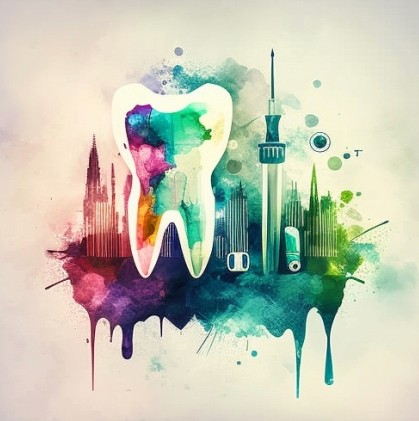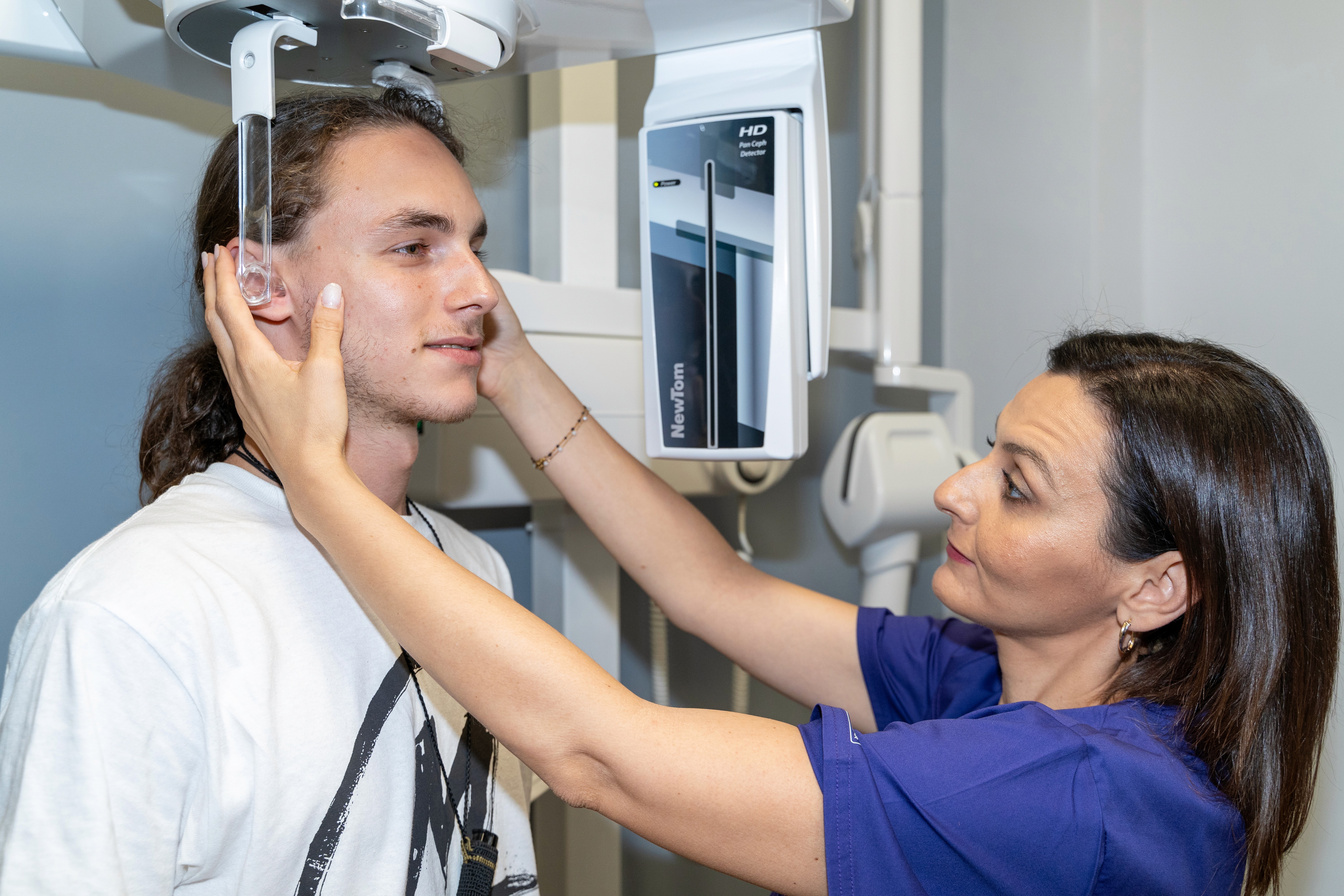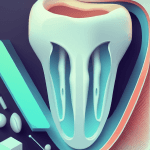Cephalometric X-Ray
Cephalometric X-Ray
Cephalometric X-Ray
Cephalometric radiography is a specialized technique for radiographing the craniofacial complex. From the lateral and anterior positions, it produces an image of the entire head and most of the cervical spine. Orthodontists commonly use it to study the relation of the maxilla and mandible and the relation of the skull with them.
Cephalometric radiography is a specialized technique for radiographing the craniofacial complex. From the lateral and anterior positions, it produces an image of the entire head and most of the cervical spine. Orthodontists commonly use it to study the relation of the maxilla and mandible and the relation of the skull with them.
Cephalometric radiography is a specialized technique for radiographing the craniofacial complex. From the lateral and anterior positions, it produces an image of the entire head and most of the cervical spine. Orthodontists commonly use it to study the relation of the maxilla and mandible and the relation of the skull with them.

Understanding Cephalometric Radiography
Cephalometric radiography offers a two-dimensional imaging of the patient's head in stable shooting conditions. It is predominantly recommended for orthodontic purposes.
Understanding Cephalometric Radiography
Cephalometric radiography offers a two-dimensional imaging of the patient's head in stable shooting conditions. It is predominantly recommended for orthodontic purposes.
Understanding Cephalometric Radiography
Cephalometric radiography offers a two-dimensional imaging of the patient's head in stable shooting conditions. It is predominantly recommended for orthodontic purposes.
Understanding Cephalometric Radiography
Cephalometric radiography offers a two-dimensional imaging of the patient's head in stable shooting conditions. It is predominantly recommended for orthodontic purposes.

Preparing for a Cephalometric Radiograph
Cephalometric X-rays don't require any specific preparation. Patients are merely asked to remove any metal objects from the head area, such as jewelry, hairpins, and glasses.
The patient stands upright and is immobilized with a cephalostat - a device with two plates, ending in ear rods that fit into the external ear canal and a nasion plate that sets on the nasal bone. The X-ray is typically taken with the patient's mouth closed, teeth in central occlusion, and lips in a resting position. Patients must remain stable for a few seconds during the procedure.
Preparing for a Cephalometric Radiograph
Cephalometric X-rays don't require any specific preparation. Patients are merely asked to remove any metal objects from the head area, such as jewelry, hairpins, and glasses.
The patient stands upright and is immobilized with a cephalostat - a device with two plates, ending in ear rods that fit into the external ear canal and a nasion plate that sets on the nasal bone. The X-ray is typically taken with the patient's mouth closed, teeth in central occlusion, and lips in a resting position. Patients must remain stable for a few seconds during the procedure.
Preparing for a Cephalometric Radiograph
Cephalometric X-rays don't require any specific preparation. Patients are merely asked to remove any metal objects from the head area, such as jewelry, hairpins, and glasses.
The patient stands upright and is immobilized with a cephalostat - a device with two plates, ending in ear rods that fit into the external ear canal and a nasion plate that sets on the nasal bone. The X-ray is typically taken with the patient's mouth closed, teeth in central occlusion, and lips in a resting position. Patients must remain stable for a few seconds during the procedure.
Preparing for a Cephalometric Radiograph
Cephalometric X-rays don't require any specific preparation. Patients are merely asked to remove any metal objects from the head area, such as jewelry, hairpins, and glasses.
The patient stands upright and is immobilized with a cephalostat - a device with two plates, ending in ear rods that fit into the external ear canal and a nasion plate that sets on the nasal bone. The X-ray is typically taken with the patient's mouth closed, teeth in central occlusion, and lips in a resting position. Patients must remain stable for a few seconds during the procedure.

Indications
Cephalometric radiography is useful for:
Orthodontic cephalometric analysis
Studying occlusion
Investigating lower face soft tissues
Examining the upper airway and sleep apnea syndrome
Preoperative evaluation for orthognathic surgery
Diagnosing jaw abnormalities such as asymmetry
Determining an orthodontic treatment plan
Evaluating therapeutic results during and after orthodontic treatment
Indications
Cephalometric radiography is useful for:
Orthodontic cephalometric analysis
Studying occlusion
Investigating lower face soft tissues
Examining the upper airway and sleep apnea syndrome
Preoperative evaluation for orthognathic surgery
Diagnosing jaw abnormalities such as asymmetry
Determining an orthodontic treatment plan
Evaluating therapeutic results during and after orthodontic treatment
Indications
Cephalometric radiography is useful for:
Orthodontic cephalometric analysis
Studying occlusion
Investigating lower face soft tissues
Examining the upper airway and sleep apnea syndrome
Preoperative evaluation for orthognathic surgery
Diagnosing jaw abnormalities such as asymmetry
Determining an orthodontic treatment plan
Evaluating therapeutic results during and after orthodontic treatment
Indications
Cephalometric radiography is useful for:
Orthodontic cephalometric analysis
Studying occlusion
Investigating lower face soft tissues
Examining the upper airway and sleep apnea syndrome
Preoperative evaluation for orthognathic surgery
Diagnosing jaw abnormalities such as asymmetry
Determining an orthodontic treatment plan
Evaluating therapeutic results during and after orthodontic treatment

Results and Radiation Exposure
After the examination, patients immediately receive the results of the medical examination in printed form, as well as on a CD. Additionally, it is electronically sent to the attending dentist for immediate updates and orthodontic treatment planning.
Radiation is ubiquitous in various forms. The dose received during a cephalometric X-ray is minimal, roughly equivalent to one day's environmental radiation exposure. However, it should only be performed if deemed necessary by the attending physician.
Results and Radiation Exposure
After the examination, patients immediately receive the results of the medical examination in printed form, as well as on a CD. Additionally, it is electronically sent to the attending dentist for immediate updates and orthodontic treatment planning.
Radiation is ubiquitous in various forms. The dose received during a cephalometric X-ray is minimal, roughly equivalent to one day's environmental radiation exposure. However, it should only be performed if deemed necessary by the attending physician.
Results and Radiation Exposure
After the examination, patients immediately receive the results of the medical examination in printed form, as well as on a CD. Additionally, it is electronically sent to the attending dentist for immediate updates and orthodontic treatment planning.
Radiation is ubiquitous in various forms. The dose received during a cephalometric X-ray is minimal, roughly equivalent to one day's environmental radiation exposure. However, it should only be performed if deemed necessary by the attending physician.
Results and Radiation Exposure
After the examination, patients immediately receive the results of the medical examination in printed form, as well as on a CD. Additionally, it is electronically sent to the attending dentist for immediate updates and orthodontic treatment planning.
Radiation is ubiquitous in various forms. The dose received during a cephalometric X-ray is minimal, roughly equivalent to one day's environmental radiation exposure. However, it should only be performed if deemed necessary by the attending physician.

Advantages and Unique Features
Cephalometric radiography:
Is fast, simple, and patient-friendly
Facilitates orthodontic treatment planning based on cephalometric analysis performed by an orthodontist on the X-ray given in physical or digital form.
Cannot be replaced by other imaging methods like lateral skull X-rays, as it must depict soft anatomical structures such as lips, nose, and chin
Can reveal fractures and skeletal abnormalities of the jaw, like asymmetry, with the aid of frontal cephalometric radiography
Advantages and Unique Features
Cephalometric radiography:
Is fast, simple, and patient-friendly
Facilitates orthodontic treatment planning based on cephalometric analysis performed by an orthodontist on the X-ray given in physical or digital form.
Cannot be replaced by other imaging methods like lateral skull X-rays, as it must depict soft anatomical structures such as lips, nose, and chin
Can reveal fractures and skeletal abnormalities of the jaw, like asymmetry, with the aid of frontal cephalometric radiography
Advantages and Unique Features
Cephalometric radiography:
Is fast, simple, and patient-friendly
Facilitates orthodontic treatment planning based on cephalometric analysis performed by an orthodontist on the X-ray given in physical or digital form.
Cannot be replaced by other imaging methods like lateral skull X-rays, as it must depict soft anatomical structures such as lips, nose, and chin
Can reveal fractures and skeletal abnormalities of the jaw, like asymmetry, with the aid of frontal cephalometric radiography
Advantages and Unique Features
Cephalometric radiography:
Is fast, simple, and patient-friendly
Facilitates orthodontic treatment planning based on cephalometric analysis performed by an orthodontist on the X-ray given in physical or digital form.
Cannot be replaced by other imaging methods like lateral skull X-rays, as it must depict soft anatomical structures such as lips, nose, and chin
Can reveal fractures and skeletal abnormalities of the jaw, like asymmetry, with the aid of frontal cephalometric radiography

Why Choose Dentalray?
While cephalometric X-ray is a simple examination for patients, it requires specialized knowledge for execution. Dentalray, with its vast experience handling thousands of cases, offers diagnostic accuracy and a friendly approach, especially for younger patients to whom this X-ray is mainly prescribed. Our focus is on continuous development and the provision of quality services. Trust Dentalray for comprehensive and precise craniofacial diagnostics.
Why Choose Dentalray?
While cephalometric X-ray is a simple examination for patients, it requires specialized knowledge for execution. Dentalray, with its vast experience handling thousands of cases, offers diagnostic accuracy and a friendly approach, especially for younger patients to whom this X-ray is mainly prescribed. Our focus is on continuous development and the provision of quality services. Trust Dentalray for comprehensive and precise craniofacial diagnostics.
Why Choose Dentalray?
While cephalometric X-ray is a simple examination for patients, it requires specialized knowledge for execution. Dentalray, with its vast experience handling thousands of cases, offers diagnostic accuracy and a friendly approach, especially for younger patients to whom this X-ray is mainly prescribed. Our focus is on continuous development and the provision of quality services. Trust Dentalray for comprehensive and precise craniofacial diagnostics.
Why Choose Dentalray?
While cephalometric X-ray is a simple examination for patients, it requires specialized knowledge for execution. Dentalray, with its vast experience handling thousands of cases, offers diagnostic accuracy and a friendly approach, especially for younger patients to whom this X-ray is mainly prescribed. Our focus is on continuous development and the provision of quality services. Trust Dentalray for comprehensive and precise craniofacial diagnostics.








